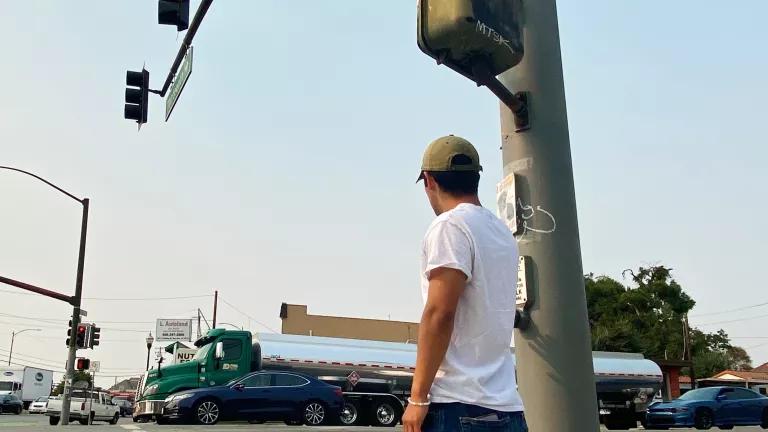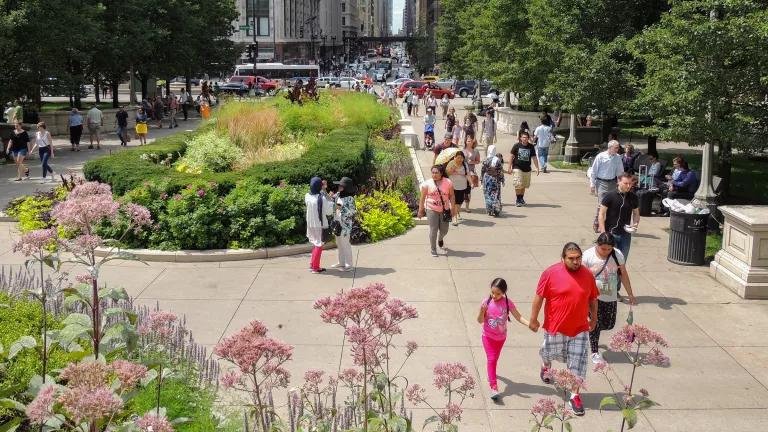Banking on the Transit Choices We Need and Deserve
America needs a transit bill that rises to the challenges we face as a nation and the essential role transit plays within the broader transportation system.

Photo by Flor Nájera on Unsplash
Our nation’s transportation system faces a raft of challenges. Due to divided Senate jurisdiction over this law, the baton is now passed to the Banking Committee to deliver the investments we need to address racial inequities and address our climate crisis. The committee leadership must meet the moment with a bold and transformative bill to provide funding and support for our nation’s struggling transit systems.
The right bill will help the millions of people who rely on public transit to get to work, doctor’s appointments or the grocery store. It will also create good jobs making and operating the cleaner equipment we need to cut pollution and protect our health.
The good news is that those at the helm of the federal transportation program, from the White House to the Department of Transportation, are ready to go big and build a better future for us all. The administration’s proposed American Jobs Plan, coupled with the FY2022 budget request, would provide unprecedented levels of federal support for the transition to a cleaner and more equitable transportation system. And the House of Representatives offered a big down payment on the American Jobs Plan with its historic INVEST in America Act, passed by the House Transportation and Infrastructure Committee last week.
Attention now turns to the Senate, where jurisdiction is divided among several committees. The Environment and Public Works Committee, with jurisdiction over highways, roads, and bridges, has already produced an underwhelming bill that would in many ways simply maintain the status quo. The Commerce Committee’s bill on inter-city rail, which is getting marked up this week, has laudable provisions but is not as ambitious with its overall level of investment as the INVEST Act as our ally Transportation for America notes in their analysis.
Fortunately, the Senate Banking Committee has jurisdiction over transit—an array of urban and rural travel options ranging from jitneys to trains—and must now meet the moment with a bold, transformative bill.
What would such a bill look like?
First and foremost, it would increase investments in transit to equal federal highway funding. The pandemic showed just how important transit is for people to access jobs, health care, and other services, yet in too many places transit is infrequent, unreliable, or simply unavailable. This is no accident—it is the result of years of underinvestment as both states and the federal government were focused on building out the nation’s road network.
In fact, federal investment in transit has been arbitrarily capped by politicians for the last 40 years at no more than 20 percent of federal transportation investment. In other words, for every dollar invested in transit, four dollars were spent on highways. This ratio is now totally out-of-whack for the U.S. According to a new report from the Metropolitan Policy Program at Brookings about 86 percent of us—286 million souls—now reside in cities and their surrounding suburbs, an increase of 23 percent from 1990. If we are serious about addressing our climate and equity challenges, we will need more and better alternatives to driving. While rural transit is vital to those parts of the country, these vehicles are particularly well-suited for metropolitan transportation systems, where an ever-increasing number of us live and work. And transit is one of the best ways of reducing single-occupancy vehicle travel, plus it supports mobility for those who can’t or choose not to drive. We need a federal transportation program for the 2050s, not the 1950s.
The Banking Committee should also revisit another historical imbalance, this one within the transit program itself. For the last two decades, federal law has limited the use of federal transit funding (except for the smallest transit agencies) to capital expenses, such as buying buses, laying tracks, building stations, etc. Capital expenses are certainly critical to quality transit, but they are only half the story.
The other half is operations, including salaries for driver or other employees and fuel or electricity to power them. Transit agencies have had to rely on fares and local (and sometimes state) funding for these purposes. The federal limitation has inhibited transit agencies from providing more frequent service or extending service to evenings and weekends, limiting the utility of transit for accessing jobs and services and forcing people either to drive or to forego those trips.
The Banking Committee should include funding to address these operating needs, as proposed in a House bill, Stronger Communities through Better Transit Act.
Delivering more transportation choices and service is crucial, and so is making the transit fleet cleaner. A forward-looking transportation law must also jumpstart efforts to transition to zero-emission buses. Programs that fund buses, including the Bus and Bus Facilities Program as well as the Low and No Emission Grant Program, should be both increased and re-focused on zero-emission vehicles. Funding must also be made available to help current workers acquire the skills they will need to operate and maintain these vehicles. Banking Chairman Sherrod Brown (D-OH) and Majority Leader Chuck Schumer (D-NY) have introduced their Clean Transit for America bill, a great model for these provisions.
Equity Focus
There are numerous other steps that the Banking Committee should take to increase equity in the transit program. Despite also having jurisdiction over housing, the Banking Committee has never really coordinated the housing and transit programs it oversees. It can take steps toward that goal in the coming bill by expanding the Transit-Oriented Development Planning Program to allow for coordinated planning around not just new transit stations, but also existing stations. The Committee could also lift laudable provisions from the INVEST Act which expand support for transit-oriented development, including affordable housing, administered by a new Office of Transit-Supportive Communities. Moreover, agencies building new rail or bus rapid transit lines should be required to demonstrate substantial efforts to preserve and increase affordable housing near future stations. Finally, the Department of Transportation should be directed to assist transit agencies in measuring and reporting on the extent to which their systems provide access to jobs and essential services, particularly for low-income people and underserved neighborhoods.
America needs a transit bill that rises to the challenges we face as a nation and the essential role transit plays within the broader transportation system. By adopting the provisions above, Chairman Brown and the Banking Committee can solidify its position as a leader in the fight against climate change and racial inequity.



